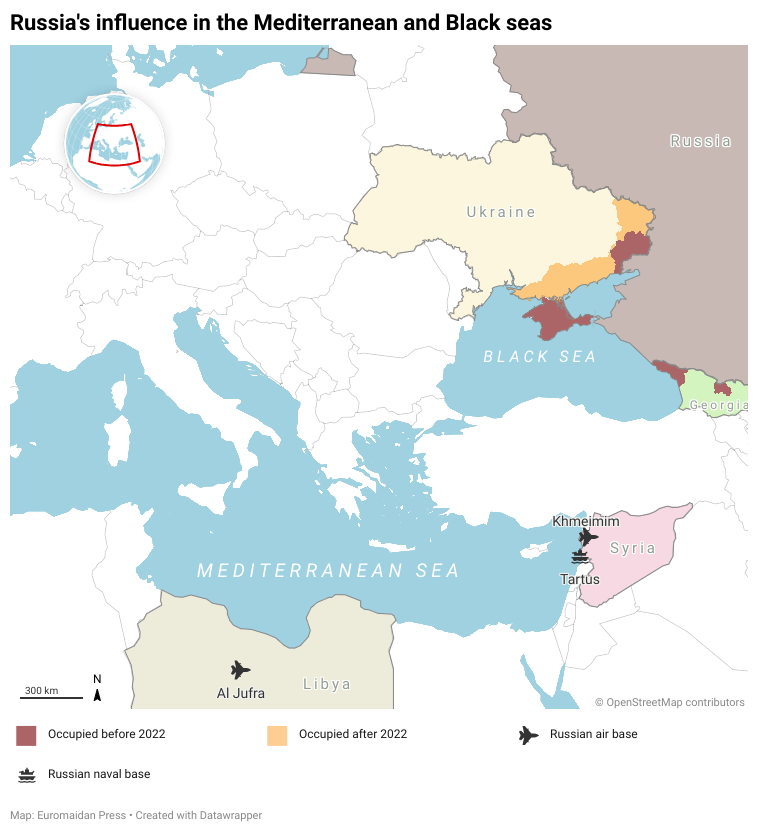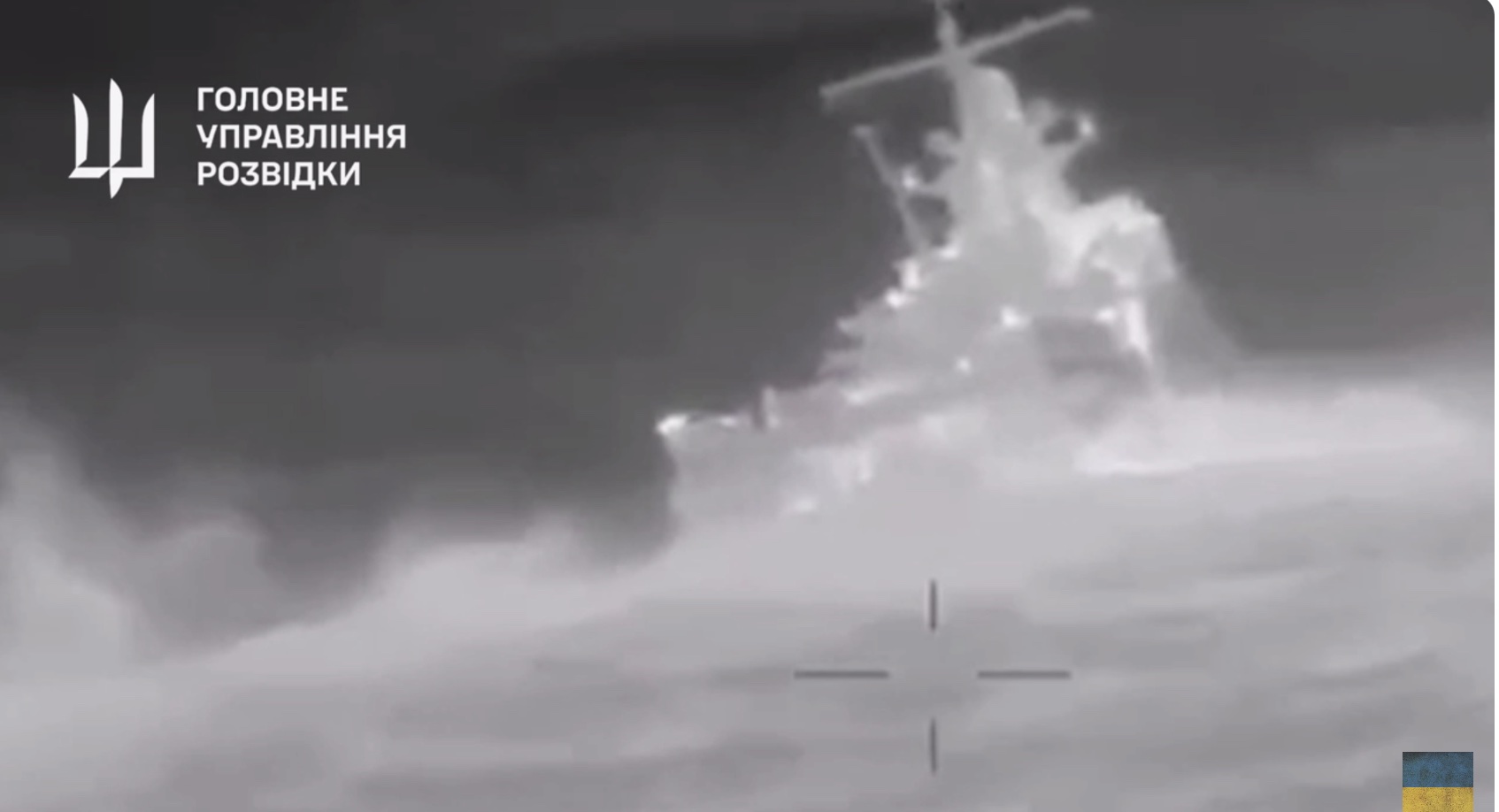Russian President Vladimir Putin’s vision of restoring Russia to its rightful place as a global power has long rested on dominating the Black Sea and projecting power in the Mediterranean and the Middle East. In the years before Russia’s full-scale invasion of Ukraine, Putin largely succeeded in that goal.
With the occupation of Abkhazia following a brief war in 2008, Russia gained control of roughly two-thirds of Georgia’s Black Sea coastline. In 2014, Russia illegally annexed the strategically important Crimean Peninsula, shifting the power balance in the Black Sea and increasing the Kremlin’s influence in the Western Balkans and the South Caucasus.

Around the same time, in 2013, Russia established its Mediterranean Squadron, with its Black Sea Fleet mainly providing the necessary ships and logistics to gain a stronger foothold in the Middle East and North Africa.
In 2015, the Russian military intervened in Syria and later began to support rebel commander Khalifa Haftar in the Libyan civil war.
Since then, Russia has upgraded its previously modest Tartus naval base in Syria to accommodate larger ships, expanded its Khmeimim air base in Syria’s Latakia province, and taken control of Libya’s Al Jufra air base– an important hub for the Kremlin’s Africa operations.
Putin was able to build a strong Russian presence in the Mediterranean – a long-held dream, dating back to imperial times – because Russia had tightened its grip on the Black Sea and was able to move assets at will between the two regions.
Russia's presence in the Mediterranean is a long-held dream, going back to imperial times
As a result, the Black Sea and the Mediterranean have merged into a single geopolitical space, with increasingly intertwined security dynamics.
But the war in Ukraine has undermined Russia’s capacity to project power and looks set to redefine its role in the Black Sea and the Mediterranean. And while the Kremlin has thus far largely maintained its role in regional politics and ties with Middle Eastern leaders, which it sees as a manifestation of its great-power status, a festering conflict in Ukraine, together with the Gaza war, could ultimately alter Russia’s geopolitical identity in the region.
Given that Russia’s naval presence and power in the Mediterranean hinges on the strength of its Black Sea Fleet, the Ukraine war’s strain on Russian resources has had a ripple effect. Ukraine has disabled or destroyed approximately one-third of Russian warships in the Black Sea. Moreover, since Türkiye closed the Bosphorus and Dardanelles straits to warships in February 2022, the Kremlin has been unable to rotate naval assets between the two regions.
The Ukraine war has also forced Russia’s military-industrial complex to focus primarily on meeting the country’s growing domestic needs rather than exporting its weaponry. This suggests that the Kremlin’s future military interventions in the Middle East will resemble its low-cost, high-impact strategy in Libya, rather than its more resource-intensive campaign in Syria.
Of course, it doesn’t help that Russian weaponry has arguably performed poorly on the battlefield in Ukraine. Such lackluster performance could reduce interest in Russian arms in the region and elsewhere. More importantly, a weakened Russian defense industry – which has traditionally tethered other countries to Russia’s interests – would further weaken the Kremlin’s influence.
Russia’s leverage over Middle Eastern countries has already declined, while the Kremlin’s dependence on Middle Eastern states has increased, including on Iran, a regional power whose drones have played a crucial role in Moscow’s campaign against Ukraine.
The Gaza war, too, is challenging Russia’s claim that it can balance different players in Middle East.
The war has driven a wedge between Russia and Israel, while Russia’s relations with Iran and its regional axis have deepened.
The Kremlin is trying to capitalize on the Global South’s growing disillusionment with Western support for Israel’s invasion of Gaza to justify its invasion of Ukraine and build support for its confrontation with the West. Indeed, the Global South has become a major narrative battleground between Moscow and the West, where the latter is losing ground amid the Gaza war.
Russia’s current geopolitical identity in the region increasingly resembles its Soviet-era one, when it supported Arab states against Israel and revolutionary Arab states against more conservative ones.
But the parallels don’t stop there. During the Cold War, Soviet power in the Middle East was arguably at its zenith in the early 1970s. But soon after, it began to fade, with Egypt’s expulsion of Soviet military personnel in 1972 marking a major turning point that heralded its subsequent switch to the US-led Western camp.
One wonders whether the Kremlin’s influence in the region peaked in the years before it launched its invasion of Ukraine.
If the war in Ukraine persists, and Russia’s position in the Black Sea continues to weaken, its influence in the Mediterranean will also wane. As NATO and the European Union devise a containment strategy against Russia, they must remember that an effective Black Sea policy requires an effective Mediterranean policy, and vice versa. In the confrontation between Russia and the West, the two regions are an integrated strategic domain.
Copyright: Project Syndicate. This article was published by Project Syndicate on 5 June 2024 and has been republished by Euromaidan Press with permission.
Editor's note. The opinions expressed in our Opinion section belong to their authors. Euromaidan Press' editorial team may or may not share them.
Submit an opinion to Euromaidan Press
Related:

